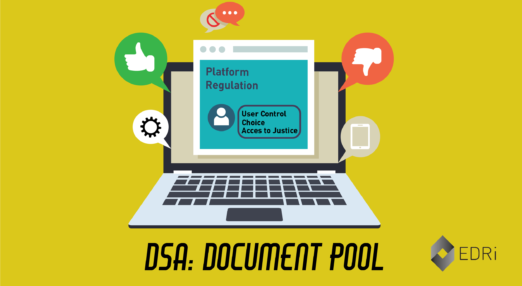e-commerce
Filter by...
-

Orwell’s Wallet: European electronic identity system leads us straight into surveillance capitalism
In June 2021 the European Commission launched a reform of the 2014 eIDAS Regulation to overhaul Europe’s framework for electronic identity (eID) systems. This ambitious reform tries to create a counterbalance to the widespread login systems of Google, Facebook and Apple, as well as to provide widely-adopted eID systems for eGovernment and eCommerce applications to the population.
Read more
-

Digital Services Act / Digital Markets Act: Document pool
The DSA-DMA package will affect how intermediaries regulate and influence user activity on their platforms, including people's ability to exercise their rights and freedoms online. It also aims at limiting the abuse of power by very large and gatekeeper platforms.
Read more
-

A privately managed public space?
Our “public spaces” online where we meet each other, organise, or speak about social issues, are often controlled and dominated by private companies (platforms like Facebook and YouTube). Pushing platforms to decide which opinions we are allowed to express and which not is not going to solve major problems in our society. The EU rules […]
Read more
-

Hate speech online: Lessons for protecting free expression
On 21 October, David Kaye – UN Special Rapporteur on the promotion and protection of the right to freedom of opinion and expression – released the preliminary findings of his sixth report on information and communication technology. They include tangible suggestions to internet companies and states whose current efforts to control hate speech online are […]
Read more
-

E-Commerce review: Safeguarding human rights when moderating online content
This is the fourth and last blog post in our series on Europe’s future rules for intermediary liability and content moderation. You can read the introduction here. In our previous blog posts on the upcoming E-Commerce review, we discussed examples of what can go wrong with online content regulation. But let’s imagine for a moment […]
Read more
-

E-Commerce review: Mitigating collateral damage
This is the third article in our series on Europe’s future rules for intermediary liability and content moderation. You can read the introduction here. Asking social media and other platform companies to solve problems around illegal online content can have serious unintended consequences. It’s therefore crucial that new EU legislation in this field considers such […]
Read more
-

More responsibility to online platforms – but at what cost?
In the European Commission’s internal note published by Netzpolitik.org on 16 July 2019, the Commission presents current problems around the regulation of digital services and proposes a revision of the current E-Commerce Directive. Such a revision would have a huge impact on fundamental rights and freedoms. This is why it’s crucial for the EU to […]
Read more
-

E-Commerce review: Technology is the solution. What is the problem?
This is the second article in our series on Europe’s future rules for intermediary liability and content moderation. You can read the introduction here. When it comes to tackling illegal and “harmful” content online, there’s a major trend in policy-making: Big tech seems to be both the cause of and the solution to all problems.
Read more
-

E-Commerce review: Opening Pandora’s box?
The next important battle for our rights and freedoms in the digital sphere is looming on the horizon. While the public debate has recently focused on upload filters for alleged copyright infringements and online “terrorist” content, a planned legislative review will look more broadly at the rules for all types of illegal and “harmful” content.
Read more
-

France and Germany: Fighting terrorism by weakening encryption
On 23 August, the French and German Ministers of Interior met in Paris to discuss an initiative that would extend surveillance in Europe and weaken encryption, in the name of the fight against terrorism. Speaking at a joint press conference, French Minister of Interior Bernard Cazeneuve and his German counterpart Thomas de Maizière called for legislation that […]
Read more
-
Leaked EU Communication – Part 1: Privatised censorship and surveillance
EU Charter of Fundamental Rights: Subject to the principle of proportionality, limitations [to fundamental rights] may be made only if they are necessary and genuinely meet objectives of general interest recognised by the Union or the need to protect the rights and freedoms of others. A draft European Commission Communication on Platforms has been leaked. […]
Read more
-

Lots to like in Advocate General’s opinion on free WiFi & copyright
Last week, Advocate General Szpunar published his opinion in the McFadden-case before the Court of Justice of the European Union (CJEU). The facts of the case In 2010, Berlin businessman Tobias McFadden was offering free, non-password protected WiFi to his customers. Sony Music claimed that the network was being used to infringe their copyrighted material, […]
Read more
